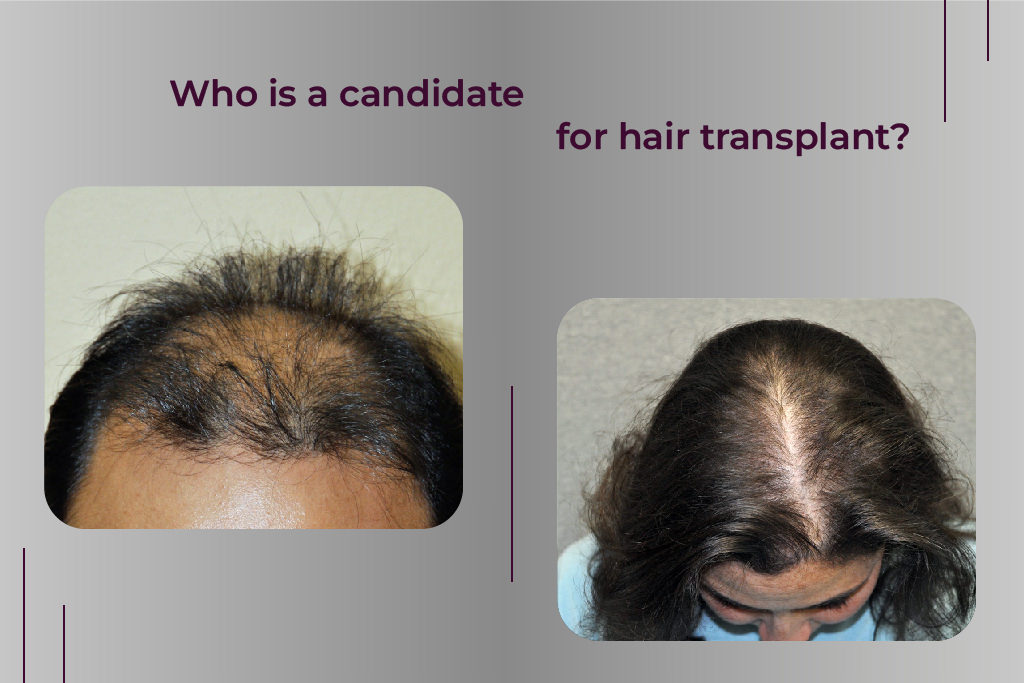
Who is a candidate for a hair transplant?
By Dr. Mark Korman MD FRCSC,
Hair Restoration Surgeon
Men and women with thinning or receding hair are candidates for hair transplantation. Using light sedation and gentle freezing, the procedure is well tolerated and produces results that are predictable and completely natural.
While the medical and surgical options that are now available allow us to offer some form of treatment to almost anyone with hair loss, there are a number of factors that we consider when determining the most appropriate alternatives for each individual.
Provided that there are no serious underlying medical conditions such as unstable heart disease, bleeding disorders, or active infections, most patients that we see are candidates from a physical health point of view. Another important factor that we look at in potential patients is emotional stability and an ability to appreciate not only the expected outcomes of treatment, but the limitations as well. For instance, a man with advanced baldness and only a thin rim of hair remaining over the ears and across the back of the scalp cannot expect to restore the lush head of hair that he had in his 20’s. Patients need to have realistic expectations.
Other factors that are important in determining an individual’s candidacy for hair transplantation are age, extent and rate of hair loss, and availability of hair in the donor area.
While I do not have an absolute cutoff for age, I am cautious about recommending hair transplants to very young patients. It is sometimes very difficult to predict what the eventual extent of hair loss will be in patients presenting in their teens and early 20’s so I often recommend at least a year of medical management to stabilize the situation before considering a transplant. If a transplant is undertaken on a relatively young patient, I favor a very conservative hairline that will continue to look natural even if the patient continues to lose the surrounding non-transplanted hair over time. Sometimes I have to spend a long time managing the expectations of younger patients who ask me to restore the hairline that they had when they were in high school.
Because it is not possible to transplant hair from one person to another, nor is it possible (yet!) to clone a persons own hair, the amount that we can transplant in any person is limited by the amount of donor hair that is available from the back and sides of the scalp.
It is a misconception that only men are candidates for hair restoration. This is unfortunate because as disconcerting as baldness can be for men, the emotional and social impact of hair loss on women can be devastating. Social expectations are different for women than they are for men. Most of my male patients recognize thinning hair as natural, albeit unwelcome condition. Conversely, a female patient that comes to see me is more likely to have significant anxiety about how hair loss is affecting her self-confidence, sexuality, career, dating prospects, or her attractiveness to her spouse. Many of my female patients have spent thousands of dollars on hair care products, styling, and a seemingly endless assortment of lotions and potions. More and more women are now recognizing the reality of hair loss and there is a worldwide trend toward women taking control and seeking treatment.
As in men, the most common cause of hair loss among women is inherited pattern baldness, however conditions such as iron or thyroid deficiencies or other hormonal imbalances may need to be ruled out. While some causes of hair loss may require specialized treatment by an endocrinologist or medical dermatologist, the most common causes of female hair loss can often be effectively treated with medication or with surgical hair restoration. There has been increasing recognition of the role of hair transplant surgery for women.
In addition to scalp hair loss, modern hair transplant techniques can be used to address hair loss in the sensitive eyebrow and eyelash areas as well as to repair scars or hairline distortion caused by previous trauma or cosmetic surgery.
The bottom line is that that both men and women who have visible hair loss, are generally healthy, and in whom there is no underlying medical condition requiring further investigation or treatment are candidates for hair transplantation. When performed well on appropriately selected patients with realistic expectations, the procedure generally leads to very gratifying results with marked improvement in hair density.
For those who wonder if they are a candidate for hair transplantation, I would say that the time to consider the procedure is when you look in the mirror, or at a photograph of yourself, and the hairline that you see does not reflect the way that you feel or the image of yourself that you wish to project to the world.
